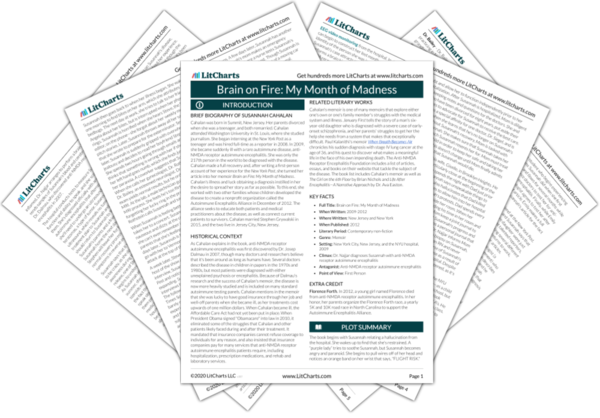Mom Quotes in Brain on Fire: My Month of Madness
"You don't have to do that," I insisted, my voice mellowing as I returned, almost instantly, to my old self. Manic episodes can fade away as quickly as they arise. "I don't want her to worry."
Even during this time when I hardly recognize myself, there are still shadows of the real Susannah, a person who cares what her family and friends think, who doesn't want to cause them pain.
Though my behavior was worsening day by day, it was still difficult for her to reconcile the old image that she had of her daughter as trustworthy, hard working, and independent with the new, unpredictable, and dangerous one.
"Her EEG was completely normal," Bailey protested, looking through my file. "MRI normal, exam normal, blood work normal. It's all normal."
"Well, she's not normal," my mom snapped as I sat there, quiet and polite with my hands folded in my lap. She and Allen had made a pact that they would not leave Dr. Bailey's office without getting me admitted to a hospital.
Though it had been eight years since their divorce, it was still hard for them to be in the same room with each other, and this shared journal allowed them to maintain common ground in the shared fight for my life.
In many ways, during that recovery period at my mother's home, I associated the pills—and the fights they engendered—with her. In a practical sense, I needed her to portion out the pills because it was far too complicated a task for me at the time. In a more emotional sense, though, I began to feel that she, like the pills, embodied my contemptible dependence.
It was one thing to live at my parents' house for a few months, knowing that I had my own place just a train ride away. Now my only home was with my mom; it was like a complete return to childhood.

Mom Quotes in Brain on Fire: My Month of Madness
"You don't have to do that," I insisted, my voice mellowing as I returned, almost instantly, to my old self. Manic episodes can fade away as quickly as they arise. "I don't want her to worry."
Even during this time when I hardly recognize myself, there are still shadows of the real Susannah, a person who cares what her family and friends think, who doesn't want to cause them pain.
Though my behavior was worsening day by day, it was still difficult for her to reconcile the old image that she had of her daughter as trustworthy, hard working, and independent with the new, unpredictable, and dangerous one.
"Her EEG was completely normal," Bailey protested, looking through my file. "MRI normal, exam normal, blood work normal. It's all normal."
"Well, she's not normal," my mom snapped as I sat there, quiet and polite with my hands folded in my lap. She and Allen had made a pact that they would not leave Dr. Bailey's office without getting me admitted to a hospital.
Though it had been eight years since their divorce, it was still hard for them to be in the same room with each other, and this shared journal allowed them to maintain common ground in the shared fight for my life.
In many ways, during that recovery period at my mother's home, I associated the pills—and the fights they engendered—with her. In a practical sense, I needed her to portion out the pills because it was far too complicated a task for me at the time. In a more emotional sense, though, I began to feel that she, like the pills, embodied my contemptible dependence.
It was one thing to live at my parents' house for a few months, knowing that I had my own place just a train ride away. Now my only home was with my mom; it was like a complete return to childhood.











